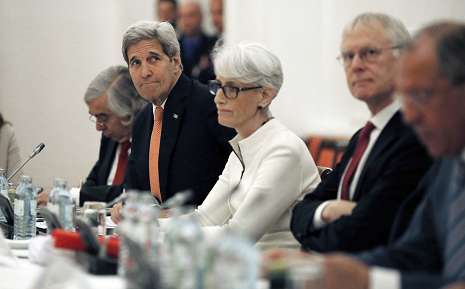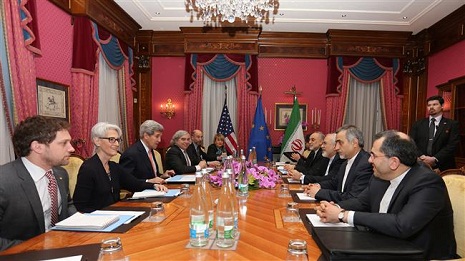A formal announcement of the agreement was expected later on Tuesday, when foreign ministers from Iran and the six nations it has been negotiating with will meet at a United Nations complex in Vienna. Catherine Ray, a spokeswoman for the European Union, said a final plenary meeting of the six nations — Britain, China, France, Germany, Russia and the United States — would take place at 10:30 a.m. in Vienna, followed by a news conference, but she provided no further details.
Diplomats declined to provide details until Secretary of State John Kerry and his Iranian counterpart, Mohammad Javad Zarif, speak at that event. Mr. Obama is expected to make a public statement in Washington, beginning a long process to sell the deal to Congress and the American public.
But the Western diplomat, who spoke on the condition of anonymity because he was discussing confidential talks, signaled that all of the main outstanding issues had been resolved, including the thorny question of how many years an embargo on conventional arms shipments into and out of Iran would remain in place.
The agreement and its annexes run more than 80 pages, Iranian officials said, outlining in painstaking detail how much nuclear fuel Iran can keep in the country for the next 15 years; what kind of research and development it can perform on centrifuges and other nuclear equipment; and the redesign of both a nuclear reactor and a deep-underground enrichment site that Israeli and American officials feared could be invulnerable to bombing.
But to strike the deal, Mr. Kerry and the other negotiators had to accept an understanding that essentially left in place most of Iran’s infrastructure at the country’s main nuclear sites, though much of it would be disassembled and put in storage. Iran is likely to cite that fact as evidence that it never gave in to the West’s demands that it dismantle its critical facilities.
The agreement not to shutter Iran’s most advanced nuclear facilities is expected to be a focal point of critics in Congress, which now has 60 days to approve or reject the deal. Those critics have already complained that the deal being discussed would only delay the day when Iran would have the ability to build an atomic weapon.
The accord will be a political agreement, not a legally binding treaty.

Some restrictions limiting Iran’s program begin to phase out after 10 years. Then, after 15 years, Iran would be free to produce as much enriched uranium as it wanted. In theory, though, the Nuclear Nonproliferation Treaty, to which Tehran is a signatory, would prevent it from taking the last steps to produce a weapon
With the announcement of the accord, Mr. Obama has now made major strides toward fundamentally changing the American diplomatic relationships with three nations: Cuba, Iran and Myanmar. Of the three, Iran is the most strategically important, the only one with a nuclear program, and it is still on the State Department’s list of state sponsors of terrorism.
Although some provisions, including the arms embargo, are expected to be especially contentious in Congress, Mr. Obama’s chances of ultimately prevailing are considered high. Even if the accord is voted down by one or both houses, he could veto that action, and he is likely to have the votes he would need to prevail in an effort to override the veto. But he has told aides that for an accord as important as this one — which he hopes will usher in a virtual truce with a country that has been a major American adversary for 35 years — he wants a congressional endorsement.
Mr. Obama will also have to manage the breach with Prime Minister Benjamin Netanyahu of Israel and the leaders of Saudi Arabia and other Arab states who have warned against the deal, saying the relief of sanctions will ultimately empower the Iranians throughout the Middle East.
The announcement comes after years of sanctions and covert cyberattacks to disable Iran’s nuclear program, which Iranian leaders say is only for peaceful purposes.
Mr. Obama and Hillary Rodham Clinton, then the secretary of state, began the effort to reach an agreement on the nuclear program by sending aides on secret missions starting in 2012 to meet Iranian diplomats and explore the opening of talks, enraging Israeli officials who had been left in the dark.
A preliminary accord struck in 2013 temporarily froze much of Iran’s program and rolled back the production of a kind of fuel that was closest to bomb grade. The ensuing negotiations have been repeatedly extended and became Mr. Kerry’s single biggest mission. Once-rare American encounters with Iranian diplomats became routine. Along the way, Mr. Kerry has spent more hours with Mr. Zarif than with any other foreign minister.
More about:















































